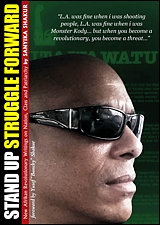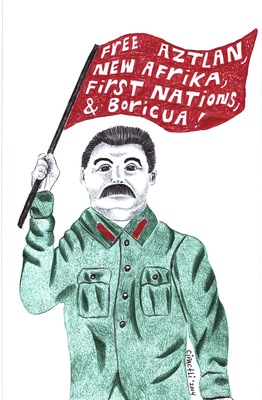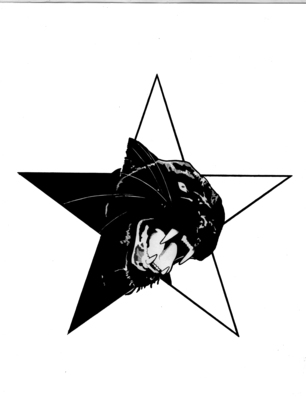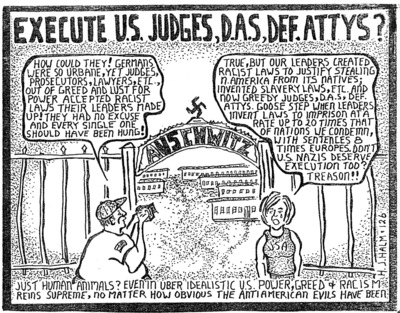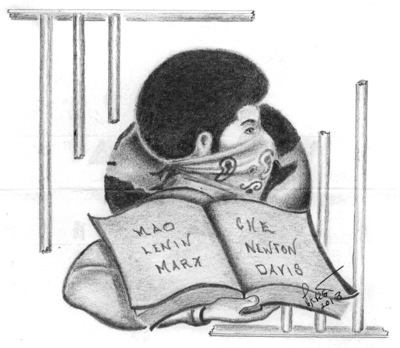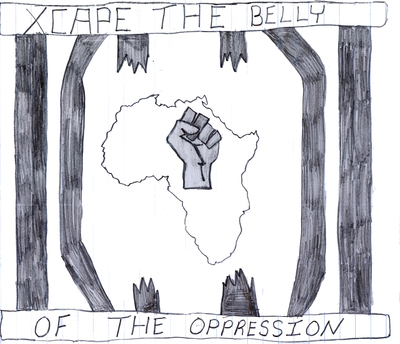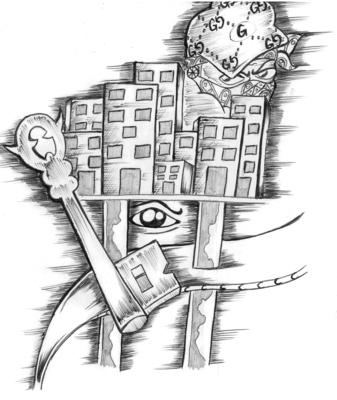
Nosotros Queremos Paz! Ellos Quieren Seguridad
El mayor propósito de la publicación #7 de Bajo Llave & Candado es el mostrar quién y quienes no quieren la paz. También nos enfocaremos linea ya - sostenida - por tiempo de que los presos no logran nada desuniendose y peleando entré sí mismos o con el personal de la prisión. Cada prisión que censura este boletín reconoce que la paz entre los presos va en contra de su meta la cual según llaman “seguridad,” y además sostiene nuestra tesis presentada abajo.
El tiempo ha comprobado … que la deferencia ciega a los oficiales de las correccionales no les hace un verdadero servicio. El asunto judicial con la regularidad de procedimiento tiene relación directa sobre el mantenimiento de la orden institucional; el cuidado ordenado con el cual las autoridades de la prisión haces sus decisiones esta íntimamente relacionado al nivel de respeto con el cual los prisioneros observan esa autoridad.
No hay nada más corrosivo a la estructura de una institución pública, como una prisión, que aquellos a los que contiene tengan el sentimiento que están siendo tratados injustamente.” Palmigiano v. Baxter, 487 F.2d 1280, 1283 (CA1 1973). Como lo notó el Juez Principal en Morrissey v. Brewer, 408 U.S. @ 408 U.S. 484, “Tratamiento justo…aumentará la oportunidad de la rehabilitación evitando reacciones de arbitrariedad.” - opinión disentido de Wolff v. McDonnell, 418 U.S. 539 (1974)
Nuestros registros de rastreo hablan por si mismos. Por lo menos docenas de presos y ex-prisioneros han dejado esas vidas que alguna vez incluían ataques físicos a los policías, y a menudo peleas contras personas, después de haber tomado la lucha anti-imperialista mediante MIM. Desafortunadamente, nuestra información esta un poquito desertada pues solo podemos hablar por los prisioneros con los que estamos en contacto. Depende de un investigador ambicioso el demostrar estadísticamente que esos envueltos en el anti-imperialismo son menos violentos que aquellos que no. (o más así como las oficinas de correo de las prisiones a lo largo del país sostienen en este caso).
Mientras tanto, hay una abundancia de estudios que enseñan como todo tipo de programas educacionales y familiares ayudan a reducir la violencia y el carácter anti-social. (1) Desafortunadamente, en un sistema enfocado en el castigo y a condenar al ostracismo a grupos de personas, estos programas son usados para manipular en vez de rehabilitar. Las prisiones de EE.UU. que ofrecen estos programas lo hacen con el esfuerzo de tentar a los presos con una zanahoria. Tomando este enfoque individualista ellos no están verdaderamente invirtiendo en paz o progreso. Cuando las prioridades cambian y un preso pierde su trabajo, o ya no puede ver a sus seres queridos, entonces ya no existe el incentivo para ser pacifico. En contraste, una dedicación a la lucha por un mundo sin opresión no puede ser quitado por administradores futuros de la prisión.
Verdades:
-
En décadas de trabajo el Movimiento Internacionalista Maoista nunca ha
roto leyes burgueses. En años de trabajo, tampoco MIM(Prisiones) lo ha
hecho.
-
Miembros de MIM y miembros de MIM(Prisiones) siempre se les ha prohibido
el romper la ley.
-
La literatura de MIM nunca ha promovido romper la ley o tomar armas en
contra del gobierno de los EE.UU. o algún gobierno u organización local
de hecho.
-
Cada publicación de Under Lock & Key, el periodico de
MIM(Prisiones), anima a que los presos obedezcan las leyes y evadir
conflictos físicos.
-
La experiencia anecdótica provee evidencia de un modelo de violencia
reducida entre prisioneros que se han envuelto en programas educativos
guiados por el MIM y/o compañías organizacionales.
A pesar de las verdades enlistadas arriba, nuestros programas y materiales son rechazados rutinariamente a los presos a lo largo de los EE.UU. A finales del 2007, lanzamos nuestra página de internet donde hemos grabado 509 incidentes de censura. La mayoría de esa censura es para MIM(Prisiones). De estos, 11 dicen STG - “Grupo de Amenaza a la Seguridad,” 34 dicen “Seguridad” en general, 14 dicen una amenaza de “violencia,” y 26 dicen de nuestra amenaza a la “ley” como la razón de la censura. Además, 164 tomaron lugar en California, donde todo el correo de MIM fue prohibido porque supuestamente “aboga el tomar el poder público mediante lucha armada y derribar las administraciones de las prisiones”quitandoles el control.”(2) Mientras que las luchas legales recientes de un camarada en California han traído a la luz un documento que inválida esta prohibición, esta aún se sigue aplicando en muchas de las prisiones donde MIM(prisiones) tenía una multitud de lectores. La mayoría del resto de los incidentes de censura caen bajo varias categorías de “inaceptable,” “no permitido,” “no autorizado:,”rechazado” o no se daba ni siquiera una razón.
Security Threat Group (STG) o “Grupo de Amenaza a la Seguridad,” es la palabra de moda adquirida en los años 1990 que se aplica a organizaciones políticas y callejeras por igual, muchos según llamados “profesionales correccionales” afirman que MIM(Prisons) es un STG. Pero exactamente, ¿para quién somos una amenaza a la seguridad? Copiando el lenguaje del precedente marco de jurisprudencia, se usa frecuentemente como “perjudicial a la seguridad, buen orden, o disciplina de la institución o […] que facilitaria actividad criminal.” El problema con el fraseo de la decisión de esta corte es que muchas prisiones interpretan que significa que si tu le dices a prisioneros que presenten demandas, escriban a la prensa, que se unan a organizaciones o entablar un juicio en respuesta a la tortura, abuso físico, falta de cuidado médico, censura, etcétera, entonces tu estas amenazando el buen orden o disciplina de la institución. (THORNBURGH v. ABBOTT, 490 U.S. 401 (1989))
Revisiones de esta y otra jurisprudencia demuestran que bajo capitalismo en America, prisioneros realmente tienen derechos y la interpretación dearriba es una violación a ellos. El real significado de esta ley sería permitir a administradores de las prisiones a censurar materiales que fomentan real e inmediatas amenazas de riesgo y seguridad, tal como planear atacar a alguien más en la prisión o contrabandear armas. El caso más reciente condenando encerrocratas por prevenir a prisioneros recibir materiales que promueven resistencia legal, fue justo el año pasado cuando un camarada en Wisconsin, ganó su pleito en la corte federal.(3)
En algunos casos la administración de la prisión ha interpretado la ley de la misma manera que nosotros lo hacemos, pero todavia afirma que violamos esta al representar una amenaza de riesgo y seguridad. El boletin de prohibición de California, citado arriba es un ejemplo de esto. En estos casos además, no estamos de acuerdo hasta el punto de llegar a involucrar a las cortes burguesas.
El memorándum de Octubre del 2006 del Director del CDCR Scott Kernan prohibiendo publicaciones de MIM (supuestamente no todo nuestro correo) tiene completamente inexactas declaraciones en este, tales como el citado arriba. Si fuera posible demostrar que MIM fomento o violó la ley sin mentir, uno de los abogados del estado ya habría hecho esto. Su defensa favorita en muchos estados es esconderse detrás de las paredes de la prisión, en vez de mentir como Scott Kernan lo hizo. Por eso es que oficiales del estado necesitan ser públicamente responsables en cualquier sociedad que alega democracia en cualquier forma.
Desde oficiales de corrección hasta el director, desempeñan el papel al pie de la letra del burócrata intentando defender su institución corrupta, y para poder actuar en el nombre de trabajos lucrativos. Nosotros admitimos ser una amenaza a los trabajos de oficiales corruptos e instituciones abusivas, como cualquier consciente ciudadano debe ser. En esta edición leerás historias de planes frustrados de paz, violentos montajes, y riesgo de pago para los C.O.s. Varios de los sindicatos representando a los así llamados oficiales de paz, son algunos de los mas fuertes en el país y su principal herramienta de influencia es la seguridad personal. Ellos dicen “estamos poniendo nuestras vidas en juego para proteger tus mierdas, es mejor que nos paguen bien.” Por lo tanto la inherente motivación por más violencia, más motines, más miembros de gangas “validados” y más máxima seguridad y prisiones supermax. Todo esto significa más dinero en sus bolsillos.
Por lo general, Amerikanos en su totalidad se benefician de sus posiciones de poder sobre los oprimidos. Ciudadanos Estadounidenses de clase media se benefician por ser miembros del grupo de gente quienes pueden ser policías o que pueden consiguen trabajos similares como opresores en el sistema de injusticia criminal, y se benefician de los servicios que los policias proporcionan manteniendo lineas entre los grupos sociales.
Esto no es solo una motivación individualista de un pago más alto, esto es además una conciencia nacional que es necesaria para crear la mentalidad de “Nosotros vs. Ellos,” que es necesaria para dirigir prisiones de la manera que ellos lo hacen en los Estados Unidos. Un ejemplo esta conciencia surgió durante el reinado de terror de Guiliani en la ciudad de Nueva York en los años 1990s, cuando el New York Times reportó que la mayoría de residentes blancos estaban conformes con la conducta de la policía que ellos veían, mientras que nueve de diez de Negras sintieron que “la policía se dedicaba en la brutalidad contra Negras.”(4)
Estas normas nacionales de “ellos contra nosotros” fueron creadas por los colonizadores blancos y esta profundamente dentro de la historia de arrebatos de tierras y comercio de esclavos. Después del tiempo esto forzó al oprimido a ver el mundo de una manera similarmente dividida, dejando a los opresores con dos alternativas; ellos pueden retractarse y usar esto como una justificación para su propia brutalidad o pueden disminuir la contradicción. Nuestro análisis de imperialismo y la contradicción principal predice que Amerikanos no pueden disminuir la contradicción, y hasta ahora hemos probado tener la razón. Y eso es porque prisiones de Estados Unidos llegaron a ser un pequeño mundo perversamente violento de la sociedad Amerikana.
Mientras que creemos que policías y oficiales correccionales en general tienen intereses conferidos para oponerse a nuestros esfuerzos para promover paz, estamos actuando en un Frente Unido con algunos empleados del enorme sistema de justicia criminal quienes están mas interesados en llegar a casa con sus familias cada noche, que consiguir una chance de pago y nuevos juguetes de alta tecnología para jugar. Esto es poco probable en lugares como California donde la historia ya ha mostrado que les pasa a los empleados de las prisiones que hablan contra estos intereses. En una nota asociada, MIM(Prisons) no amenaza las vidas de las personas ni induce gente al suicidio, ni lleva a cabo asesinatos.
Muchos empleados de las prisiones afirman que MIM(Prisons) es una amenaza porque animamos a prisioneros a organizarse. Miramos a la historia otra vez, y ayudamos a sofocar esos temores tomando una mirada a dos de los mas grandes ejemplos de prisioneros organizadose ellos mismos: Attica y Walpole. En la rebelión de Attica en 1971, no fueron asesinados oficiales correccionales hasta que la Guardia Nacional entró y baleó a muerte a 11 empleados junto con 29 prisioneros. Hasta ese punto los prisioneros de Attica habían organizado una sociedad dirigida democráticamente dentro de las paredes de la prisión, incluyendo cosas tales como su propia comida y servicios médicos, mientras que estaban negociando con el Estado en nombre de todos los prisioneros. A los guardias se les dio trato superior todo el tiempo.
Un par de años más tarde, prisioneros en Walpole se les fue permitido dirigir la prisión ellos mismos cuando el sindicato de los guardias se fue a la huelga. Ellos crearon servicios similares como los prisioneros de Attica, y en realidad incrementaron la eficiencia de operación de la prisión con los guardias y burócratas fuera del camino. Esto mostró que tan pronto como a principios de los años 70s, que a los guardias de prision se le pagaban altos salarios por hacer nada. Desde entonces la población de la prisión se ha incrementado ocho veces, haciendo engordar la labor aristocrática con trabajos de salarios más altos a lo largo del camino.
Los prisioneras funcionando pacíficamente sin supervisores impactó a los puercos, quienes entonces empezaron a correr rumores acerca de motines dentro de Walpole. Los motines nunca sucedieron, y de hecho hubo a fin a toda violencia y violaciones durante la semanas en que los guardias de la prisión estuvieron ausentes, y por algún tiempo después. Esta clase de rumores continuos no es única a un grupo particular de guardias malévolos. En vez de eso, ellos estaban representando el mismo interés heredado de esta clase de gente. En los últimos 15 a 20 años en California, ellos han tenido éxito en crear una atmósfera de disturbios y violencia. Unicamente la minoría lleva a cabo su-mismo-interés en paz, porque esta es una amenaza a sus trabajos como clase.
Desafortunadamente, podemos esperar mucha violencia de los opresores antes de que podamos esperar un honesto juicio de lo que esta pasando en estos reservados calabozos. La gente quiere paz ahora. Comunidades que están siendo ocupadas, encarceladas y bombardeadas quieren un inmediato fin a la violencia.
Huey P. Newton dijo que le corresponde al opresor decidir si satisfacer tales demandas del oprimido pasan de una manera pacifica o de una manera violenta. Frantz Fanon dijo que la violencia es parte del desarrollo humanista y nueva conciencia entre la gente. Aún si Fanon esta en lo correcto, toma mucho para presionar a las multitudes hasta el punto de violencia como Huey lo indicó. Esto es obvio con la tanta gente que ha pasado más días en sumisión pacifica que estos quienes no. Resistencia violenta de la gente surgirá como esta sea necesitada por los que monopolizan violencia a través de su propio poder.
MIM(prisons) únicamente entabla y promueve medios legales para combatir injusticia. Cuando el personal de las prisiones reprime cada salida educacional y legal para prisioneros para reparación de sus quejas, entonces se hace claro que clase de estrategias están promoviendo. En esas prisiones, predecimos que habrá violencia, y ellos no pueden culparnos de esto porque ellos nos han mantenido fuera.
Esto es igual a lo que decimos de todas las luchas por justicia alrededor del mundo. Creemos que la violencia es necesaria para acabar con la injusticia porque la historia ha mostrado que el opresor nunca para de oprimir de una u otra manera. No queremos fomentar violencia, estamos simplemente declarando nuestra conclusión leyendo la historia. En cada caso de guerra revolucionaria, dependió del opresor decidir si la violencia fuera usada o no. La historia muestra que lo mismo ha sido verdad en el movimiento de los derechos en la prisión; la lucha por los derechos de los prisioneros ha llegado a ser únicamente violenta cuando el Estado ha iniciado la violencia.
Vea además The Nation, March 4, 2005: “Estudios claramente han mostrado
que participantes en educación dentro de la prisión, vocación y
programas de trabajo tienen índices de reincidencia de 20 a 60 por
ciento más bajos que los no participantes. Otro reciente y mayor estudio
de prisioneros encontró que participantes en programas de educación eran
29 por ciento menos probables de terminar de regreso a prisión, y que
participantes han ganado un salario más alto en libertad.”
2. El
texto completo de esta carta esta disponible en nuestro sitio web a lo
largo con ciento de toneladas de otros documentos relacionados a la
prohibición de California:
https://www.prisoncensorship.info/campaigns/ca/
(si tu eras un preso de California probablemente ya la has visto.)
3.
Lorenzo Johnson v. Rick Raemisch, Daniel Westfield, and Michael Thurmer,
Case No. 07-C-390-C US District Court Western District of Wisconsin.
Disponible pronto en nuestra página de archivo.
4. Hayden, Tom.
Street Wars. The New Press, 2005, p.108.








